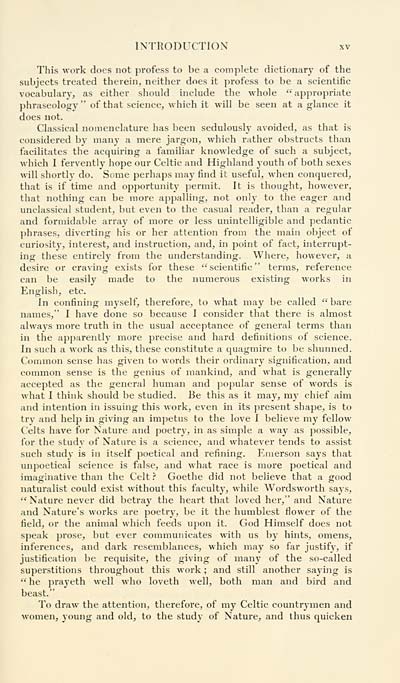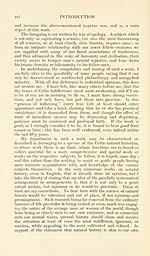Download files
Complete book:
Individual page:
Thumbnail gallery: Grid view | List view

INTRODUCTIOM xv
This work does not profess to be a complete dictionarj' of the
subjects treated therein, neither does it pi'ofess to be a scientific
vocabulary, as either should include the whole "appropriate
phraseology " of that science, which it will be seen at a glance it
does not.
Classical nomenclature has been sedulously avoided, as that is
considered by many a mere jargon, which rather obstructs than
facilitates the acquiring a familiar knowledge of such a subject,
which I fervently hope our Celtic and Highland youth of both sexes
will shortly do. Some perhaps may find it useful, Avhen conquered,
that is if time and opportunity j^ermit. It is thought, however,
that nothing can be more appalling, not only to the eager and
unclassical student, but even to the casual reader, than a regular
and formidable array of more or less unintelligible and pedantic
))hrases, diverting his or her attention from the main object of
curiosity, interest, and instruction, and, in point of fact, interrupt-
ing these entirely from the understanding. Where, however, a
desire or craving exists for these "scientific" terms, reference
can be easily made to the numerous existing works in
English, etc.
In confining myself, therefore, to what may be called "bare
names," I have done so because I consider that there is almost
always more truth in the usual acceptance of general terms than
in the apj)arently more precise and hard definitions of science.
In such a work as this, these constitute a quagmire to be shunned.
Common sense has given to words their ordinary signification, and
common sense is the genius of mankind, and what is generally
accepted as the general human and popular sense of words is
what I think should be studied. Be this as it may, my chief aim
and intention in issuing this work, even in its present shape, is to
trv and help in giving an impetus to the love I believe my fellow
Celts have for Nature and poetry, in as simple a way as possible,
for the study of Nature is a science, and whatever tends to assist
such study is in itself poetical and refining. Emerson says that
unpoetical science is false, and what race is more poetical and
imaginative than the Celt ? Goethe did not believe that a sood
naturalist could exist without this faculty, while Wordsworth says,
"Nature never did betray the heart that loved her," and Nature
and Nature's works are poetry, be it the humblest flower of the
field, or the animal which feeds upon it. God Himself does not
speak pi'ose, but ever communicates with us by hints, omens,
inferences, and dark resemblances, which may so far justifj', if
justification be requisite, the giving of many of the so-called
superstitions throughout this work ; and still another saying is
" he prayeth well who loveth well, both man and bird and
beast."
To draw the attention, therefore, of my Celtic countrymen and
women, young and old, to the study of Nature, and thus quicken
This work does not profess to be a complete dictionarj' of the
subjects treated therein, neither does it pi'ofess to be a scientific
vocabulary, as either should include the whole "appropriate
phraseology " of that science, which it will be seen at a glance it
does not.
Classical nomenclature has been sedulously avoided, as that is
considered by many a mere jargon, which rather obstructs than
facilitates the acquiring a familiar knowledge of such a subject,
which I fervently hope our Celtic and Highland youth of both sexes
will shortly do. Some perhaps may find it useful, Avhen conquered,
that is if time and opportunity j^ermit. It is thought, however,
that nothing can be more appalling, not only to the eager and
unclassical student, but even to the casual reader, than a regular
and formidable array of more or less unintelligible and pedantic
))hrases, diverting his or her attention from the main object of
curiosity, interest, and instruction, and, in point of fact, interrupt-
ing these entirely from the understanding. Where, however, a
desire or craving exists for these "scientific" terms, reference
can be easily made to the numerous existing works in
English, etc.
In confining myself, therefore, to what may be called "bare
names," I have done so because I consider that there is almost
always more truth in the usual acceptance of general terms than
in the apj)arently more precise and hard definitions of science.
In such a work as this, these constitute a quagmire to be shunned.
Common sense has given to words their ordinary signification, and
common sense is the genius of mankind, and what is generally
accepted as the general human and popular sense of words is
what I think should be studied. Be this as it may, my chief aim
and intention in issuing this work, even in its present shape, is to
trv and help in giving an impetus to the love I believe my fellow
Celts have for Nature and poetry, in as simple a way as possible,
for the study of Nature is a science, and whatever tends to assist
such study is in itself poetical and refining. Emerson says that
unpoetical science is false, and what race is more poetical and
imaginative than the Celt ? Goethe did not believe that a sood
naturalist could exist without this faculty, while Wordsworth says,
"Nature never did betray the heart that loved her," and Nature
and Nature's works are poetry, be it the humblest flower of the
field, or the animal which feeds upon it. God Himself does not
speak pi'ose, but ever communicates with us by hints, omens,
inferences, and dark resemblances, which may so far justifj', if
justification be requisite, the giving of many of the so-called
superstitions throughout this work ; and still another saying is
" he prayeth well who loveth well, both man and bird and
beast."
To draw the attention, therefore, of my Celtic countrymen and
women, young and old, to the study of Nature, and thus quicken
Set display mode to: Large image | Transcription
Images and transcriptions on this page, including medium image downloads, may be used under the Creative Commons Attribution 4.0 International Licence unless otherwise stated. ![]()
| Early Gaelic Book Collections > Blair Collection > Gaelic names of beasts (mammalia), birds, fishes, insects, reptiles, etc > (21) |
|---|
| Permanent URL | https://digital.nls.uk/79329499 |
|---|
| Description | A selection of books from a collection of more than 500 titles, mostly on religious and literary topics. Also includes some material dealing with other Celtic languages and societies. Collection created towards the end of the 19th century by Lady Evelyn Stewart Murray. |
|---|
| Description | Selected items from five 'Special and Named Printed Collections'. Includes books in Gaelic and other Celtic languages, works about the Gaels, their languages, literature, culture and history. |
|---|

